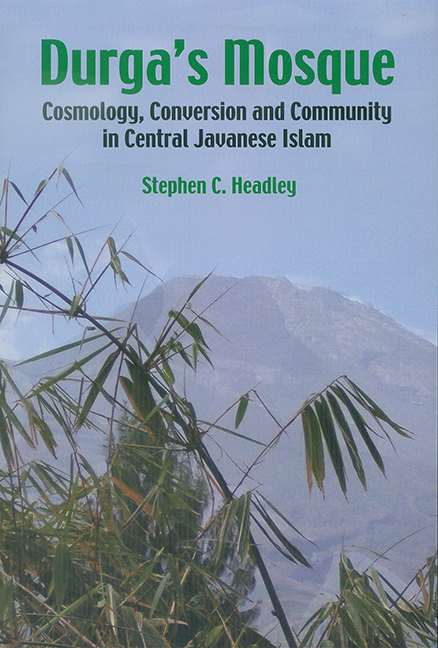Book contents
- Frontmatter
- Contents
- List of Figures
- List of Tables
- Preface
- Acknowledgements
- Introduction: Cosmology, Conversion and Community in Javanese Islam
- PART I THE SOCIOLOGY AND PRACTICE OF RELIGION IN CENTRAL JAVA
- PART II RECONSTRUCTION OF LOCAL RELIGIOUS HISTORY
- PART III INVOKING THE COSMOS, MAGNIFYING ALLAH: STRUCTURING A LANDSCAPE IN THE SEVENTEENTH TO NINETEENTH CENTURIES
- PART IV COSMOLOGY, CONVERSION AND COMMUNITY IN CENTRAL JAVANESE ISLAM TODAY
- 12 Jihad in Java: An Islamic Appropriation of Individualism
- 13 Of Sacred Wells and Shopping Malls: Glimpses of the Reconstruction of Social Confidence in Solo after Soeharto
- 14 The Social Reconstruction of Confidence: Community and Islam in Surakarta Today
- 15 Enclosing Cosmologies and Elective Citizenship
- Bibliography
- Index
- About the Author
13 - Of Sacred Wells and Shopping Malls: Glimpses of the Reconstruction of Social Confidence in Solo after Soeharto
from PART IV - COSMOLOGY, CONVERSION AND COMMUNITY IN CENTRAL JAVANESE ISLAM TODAY
Published online by Cambridge University Press: 21 October 2015
- Frontmatter
- Contents
- List of Figures
- List of Tables
- Preface
- Acknowledgements
- Introduction: Cosmology, Conversion and Community in Javanese Islam
- PART I THE SOCIOLOGY AND PRACTICE OF RELIGION IN CENTRAL JAVA
- PART II RECONSTRUCTION OF LOCAL RELIGIOUS HISTORY
- PART III INVOKING THE COSMOS, MAGNIFYING ALLAH: STRUCTURING A LANDSCAPE IN THE SEVENTEENTH TO NINETEENTH CENTURIES
- PART IV COSMOLOGY, CONVERSION AND COMMUNITY IN CENTRAL JAVANESE ISLAM TODAY
- 12 Jihad in Java: An Islamic Appropriation of Individualism
- 13 Of Sacred Wells and Shopping Malls: Glimpses of the Reconstruction of Social Confidence in Solo after Soeharto
- 14 The Social Reconstruction of Confidence: Community and Islam in Surakarta Today
- 15 Enclosing Cosmologies and Elective Citizenship
- Bibliography
- Index
- About the Author
Summary
INTRODUCTION
It was not immediately after the turmoil of May 1998 that calls for jihad appeared. The initial efforts to deal with the fractured Javanese society came from a healthy reform movment that wanted to promote social solidarity. Élite competition for the spoils of the defunct dictatorship came later. It could be many years before historians, economists, and other social scientists have a clear perspective on the changes wrought in Indonesia by the fall of General Soeharto's regime in 1998. In this chapter and the following one we will move our focus away from the rural area north of Surakarta and study the rituals and social healing practised in the city of Solo following these traumatic events. The urban scene south of the district of Kaliasa is chosen because of the apocalyptic disturbances that led to the sacking of the city of Surakarta. Theatre appears crucial for representing to the victims the trauma of these events.
Javanese wayang, a highly “traditional” art form, might be expected to evolve more slowly than other social indicators, artistic or otherwise, in reaction to such political upheaval. However, the very nature of wayangtheatre, and the nature of any living “tradition,” is indeed to evolve within its own structures. For once “tradition” becomes a completely static and immovable entity it is in textbooks and museums but not in the streets in tense times of rapid social change. Within wayang, the purification, or ruwatan genre, occupies a receptive place for change. For how can one claim to purify unless one heals today's ills? The agency of wayang during exorcisms addresses the current needs of the local populace. But how does it do so? More specifically, how can it address such all-encompassing social crises as the fall of the New Order regime?
The fall of General Soeharto created many new social currents in the later half of 1998 and during 1999. The social reconstruction of confidence, required for society to continue, took many forms. The economy had been going through a total crisis (1997+). Local neighbourhood committees in the town of Surakarta (Solo), as in many other places, were mobilized to protect the neighbourhoods (kampung) at night and help the poorest to get by through aid in kind and money.
- Type
- Chapter
- Information
- Durga's MosqueCosmology, Conversion and Community in Central Javanese Islam, pp. 453 - 473Publisher: ISEAS–Yusof Ishak InstitutePrint publication year: 2004

